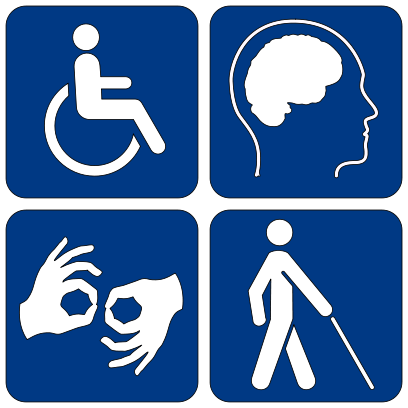We acknowledge the ongoing discussion about identity vs. first-person language. We respect both choices as made by members of the disabled community. In this document, we use person-first language as is often the standard for academic publications. For more information on this on-going discussion, go to our inclusive community page and see "on 'person-first language.'"
Faculty with disabilities on campus
Creating inclusive environments for students with disabilities also means recognizing and supporting faculty and staff with disabilities on campus. In fact, without recruitment and retention of disabled faculty, it may be hard to argue that the goals of inclusion have been truly met in any university environment. Research suggests that between 15 to 20% of our faculty, or any workforce have disabilities. Faculty with disabilities add to the diversity of our campus and deserve support and accommodations, in compliance with our DEI mission, the Americans with Disabilities Act ,and University of Colorado Regent Policy.
Accommodations are provided to faculty members who have disabling conditions that impact performance in the workplace
This can include faculty who have had disabilities since birth, later or recently acquired disabilities, and, in some instances, faculty with temporary disabilities. Some disabilities are visible to others while many are in fact not observable. The types of disabilities that may need accommodations include but are not limited to:
- mobility disabilities (such as paralysis, arthritis, and repetitive stress injury)*
- sensory disabilities (such as severe vision impairments and hearing loss)
- learning disabilities (such as ADHD, dyslexia, and dysgraphia)
- chronic health conditions (such as fibromyalgia, multiple sclerosis, and Chron's)
- psychological/psychiatric conditions (such as depression, anxiety, and bipolar disorders)
- neurological disabilities (such as epilepsy, Parkinson's, and types of neurodiversity)
- temporary conditions (broken bones, surgical and cancer recovery, and pregnancy complications)
The nature of accommodations for disabled faculty vary
Accommodations can include office arrangements and furniture, ASL interpreters, text to speech software and other assistive technology, schedule adjustments and more. In some cases, faculty will know what they need to accommodate their disabilities (particularly long-standing ones), while in other cases, faculty may require assistance in figuring out appropriate accommodations. The ADA Coordinator can provide support for all faculty members requesting accommodations and help them identify what accommodations are available to them in the workplace.
Seeking support in obtaining accommodations
The CU Denver ADA Coordinator is available to answer questions about the process of obtaining accommodations. The coordinator can also arrange for a third-party evaluator/vendor to provide evaluative services (such as an occupational therapy evaluation or an assistive technology consult). The ADA Coordinator will work with the faculty member to verify the medical condition and obtain the necessary paperwork for processing accommodations.
Faculty have two options when seeking accommodations for disabilities
- The faculty member can contact the ADA Coordinator. To obtain accommodations, the faculty member will be required to share information about his/her disability. In most cases, the ADA Coordinator will ask the disabled faculty member to visit his or her doctor to complete the required paperwork. The ADA Coordinator then makes the department chair or dean aware of what is needed and coordinates the accommodations to be provided. Faculty members can decide if they want to share information about the nature of their disabilities with their department chair or dean or only disclose required accommodations as determined by HR. Faculty members are not required to disclose information on their disability beyond what is required to the ADA coordinator for the accommodations process and their information is protected under HIPAA.
- The faculty member can contact his/her department chair or dean to discuss needed accommodations. Working together, the faculty member and department chair or dean can determine relevant accommodations (especially in cases where the accommodations are minor). The ADA coordinator can also be consulted if need arises.
Department chairs and/or deans, as supervisors, play a crucial role in facilitating faculty accommodations
The process of faculty accommodations typically works through department and college leaders, not only between the ADA Coordinator and disabled faculty member. It is crucial that department chairs and deans understand the process and reach out to the ADA Coordinator for guidance when needed, understand their responsibilities in accordance with ADA policy. All information about the nature of a faculty member's disability must be kept in confidence in accordance with HIPAA, and the faculty member has the right to inquire as to who, what, and how this information will be shared.
While the particular school/college of the faculty member is asked to absorb the costs associated with providing accommodations, the University of Colorado is our employer and legally responsible for assuring faculty accommodations in compliance with federally mandated ADA policy.
Contact the ADA Coordinator through HR for more information: (303) 315-2700.
Contact the FA DisC: The CU Denver Faculty Assembly Disability Committee (DisC) is interested in hearing from faculty members with disabilities and their allies about their experiences with the ADA process and accessibility issues they face on our campus. If you have concerns about disclosing your disability or the assistance and services you wish to or have received, you are welcome to contact the DisC and confidentially speak to one of our members.
Colleen Donnelly, Chair
Faculty Assembly Disability Committee
colleen.donnelly@ucdenver.edu
*Please note that Auraria is private property and does not observe the free and extended parking granted in Denver for those displaying disability placards.

